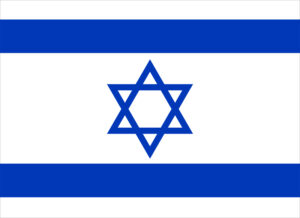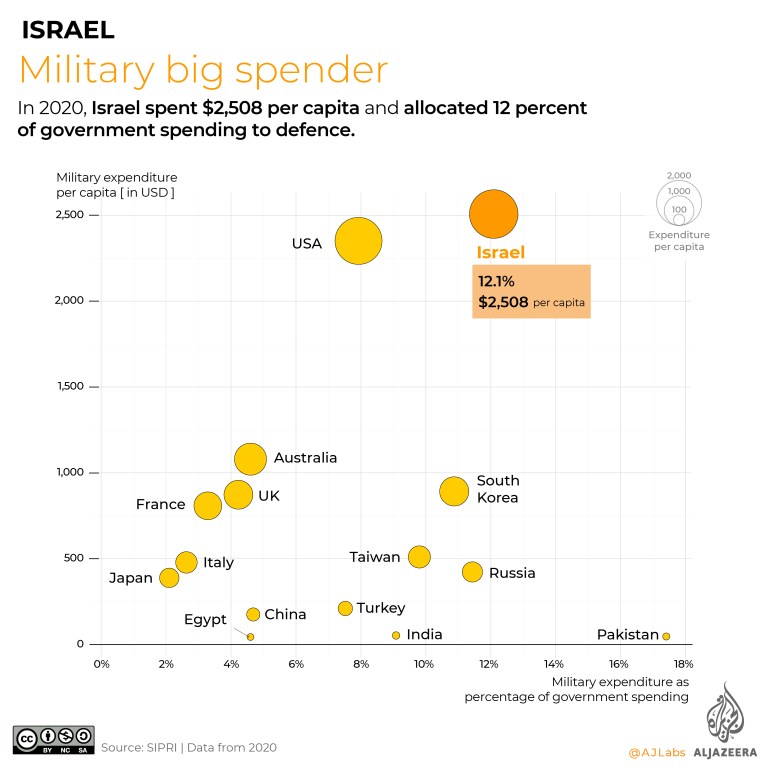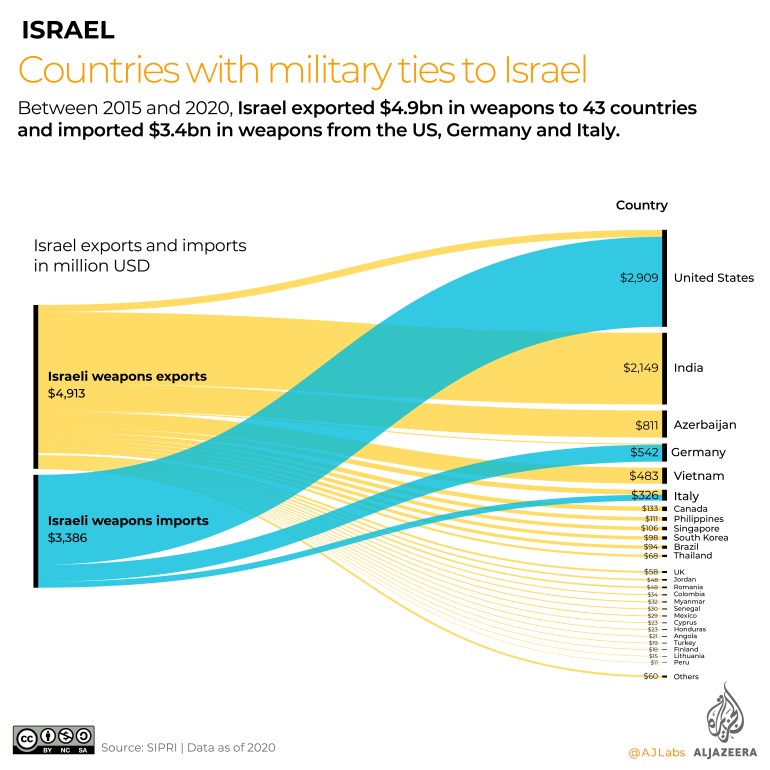
A longstanding recipient of US military aid, Israel has developed a domestic arms industry and become a key global supplier.

Last month, as Israel bombarded the besieged Gaza Strip for the fourth time in 12 years, the United States approved a $735m arms sale to Israel. The approval was criticised by legislators in Congress, and several Democrats introduced resolutions to block the sale of Boeing’s precision-guided missiles.
Israel’s 11-day military campaign killed at least 253 people, including 66 children, in Gaza. At least 12 people were killed in Israel by rockets fired by Palestinian armed groups in Gaza. The UN Human Rights Council has set up a panel to investigate both sides for possible war crimes and human rights group Amnesty International has renewed its call for a halt to US weapons sales to Israel.
Gaza has been described as the world’s largest open-air prison. Since 2006, Israel has imposed a land, sea and air blockade on its 2.1 million inhabitants. Israeli forces continue to militarily occupy East Jerusalem and the West Bank where they have built hundreds of illegal settlements.
Maintaining Israel’s regional military hegemony is a core element of the US’s Middle East policy. This has been achieved by an interplay of US funding and a rising Israeli domestic arms industry.
Here is what you need to know about Israel’s military and arms industry.
How much does Israel spend on its military?
Israel operates a vast military apparatus where military service is mandatory for citizens over the age of 18. In 2020, the country spent $22bn on its military, according to a database compiled by SIPRI, a research institute focused on conflict and armaments. Israel spent some $2,508 per capita and allocated 12 percent of its total government spending to defence.
Visualised, the combination of these metrics shows how much of an outlier Israel’s weapons spending is relative to some of the largest militaries in the world, including the five permanent members of the UN Security Council.

Israel is a key global supplier of advanced weaponry, including drones, missiles, radar technology and other weapons systems. In 2020, it was the 12th-biggest arms supplier with more than $345m in weapons sales to 16 countries, according to the SIPRI database.

How much does the US spend on Israel’s military?
The US is by far the biggest supplier of military aid to Israel, providing the country with a total of $3.8bn in 2020 as part of a record $38bn deal across a 10-year period signed under former US President Barack Obama in 2016. Previously, Israel also received substantial US economic aid along with military supplies. As Israel has grown richer, economic aid, which began in 1951, has been phased out and was almost eliminated in 2007.
The US imposes conditions on how aid, particularly military aid, can be used. For instance, the Leahy Law prohibits the export of US defence articles to military units complicit in human rights abuses. However, no Israeli unit has been penalised under this law. Similarly, US economic aid to Israeli institutions such as universities was historically required to be utilised within Israel’s pre-1967 borders. This condition was waived under the Trump administration.
In comparison, the US allocated $19m in all forms of aid to the Palestinians in 2020, according to USAID, after the Trump administration suspended most funding to the Palestinian Authority as his government promoted a so-called “peace plan” that the Palestinians denounced as one-sided.
Since the PA was established in 1994, the US has provided $5bn in total assistance. Unlike aid to Israel, Palestinian aid has many conditions. For instance, under the Taylor Force Act, economic aid can be cut off if the Palestinian Authority makes any “payments that incentivize terror”. The Biden administration has indicated it will resume aid to the Palestinians, although the totals will remain a fraction of those provided to Israel.
Washington is also bound, under its domestic laws such as the US-Israel Strategic Partnership Act of 2014, to protect Israel’s so-called “qualitative military edge”, meaning Israel should maintain military superiority over its regional neighbours. The law guarantees Israel access to advanced US weapons. US officials also regularly discuss regional defence sales with Israel, to ensure that their ally is not disadvantaged militarily.

US support for Israel commenced in 1948 when the latter declared independence, and the US was one of the first countries to recognise Israel. Shortly after, the US started providing economic aid, and to a much smaller extent, military aid to the new state.
However, military aid to Israel greatly increased after the 1967 Six-Day war when Israel defeated neighbouring Arab armies and began occupying the West Bank, East Jerusalem and Gaza. The skew towards military financing since 1967 has meant that it represents nearly 80 percent of all aid provided by the US.
Israel has long been seen by US legislators as an ally to help protect US strategic interests in the Middle East. Initially, this included the containment of Soviet influence in the region. According to the US Congressional Research Service, factors for the continuing military support to Israel include shared strategic interests, “domestic US support for Israel” and “a mutual commitment to democratic values”.
US funding for Israel has typically been, and remains, a bipartisan affair, with both Democrat and Republican administrations providing it. During the past two decades, US aid for Israel’s military has increased despite Israeli military campaigns in Gaza in 2008/2009, 2012 and 2014 that have killed more than 3,500 Palestinians. Approximately 100 Israelis have been killed during the course of the three wars.

Regarding the spike in US military aid in 2003, Stephen Zunes, professor of politics at San Francisco University, noted that the increase “was part of an overall increase in US arms transfers to the Middle East and US military spending” in the wake of the 2001 al-Qaeda attacks on the US, the US-led war in Afghanistan and the invasion of Iraq.
“US aid to Israel has always been primarily in relation to how Israel could assist in advancing perceived US strategic objectives, not about Israeli security needs,” he told Al Jazeera.
With respect to the surge in US military aid in 2000, Zunes noted that the US had agreed in the 1998 Wye River Memorandum to boost aid to Israel “in return for [relatively minor] Israeli concessions in the Israeli-Palestinian peace talks”.
“Since budgets are put forward the year prior, this was the first budget subsequent to that meeting and was therefore probably a result of that,” he said.
Israel is the most significant recipient of total US foreign military financing (FMF) – a programme that provides grants and loans to US allies to acquire “US defense equipment, services and training”. During the past two decades, 55 percent of all US FMF was dedicated to Israel, more than the rest of the world combined, according to Security Assistance Monitor, part of the Center for International Policy, a Washington DC-based think-tank.

These numbers do not reflect other indirect forms of military aid. For example, the US military maintains a large “emergency” stockpile of weapons in Israel. Currently valued at $3.4bn, the Israeli military can use this cache in emergencies.
South Korea has a similar arrangement. These arrangements were originally designed to facilitate rapid US troop deployment. In practice, for Israel, they serve as an extra layer of defence and allow the Israeli army to rapidly access ammunition and weaponry during a conflict. Unlike other FMF recipients, Israel is allowed to use FMF funds to buy from local companies until 2028, under the latest US-Israel MOU on defence.
Israel’s military imports and exports
Historically, Israel’s weapons imports have far outweighed its exports. However, during the last decade, exports have begun to consistently eclipse imports, the SIPRI database showed.
According to Neve Gordon, professor at Queen Mary University in London, Israel has used Palestine, Lebanon and Syria as a “showcase for products that are developed by Israel’s military-industrial complex”.
“This is extremely important for the export industry, since the producers of the weapon and surveillance systems can claim that they were used in actual combat situations and their effectiveness was tested,” told Al Jazeera.

Israel imports weapons exclusively from Western countries, with 83 percent of its imports coming from the US between 1950 and 2020. In contrast, 23 percent of its exports went to India, and it has exported far and wide. Israel controversially continued exports to South Africa’s apartheid government.
The two countries signed a secret defence agreement in 1975 to circumvent a global trade embargo imposed on South Africa because of its apartheid policies.

From 2015 to 2020, Israel’s major weapons export markets were, as a percentage of the total, India (43 percent), Azerbaijan (16 percent), Vietnam (10 percent) and the US (4 percent), according to the SIPRI database. India was the largest buyer of Israeli weapons in 2020.
Relations between the two countries have blossomed since Indian Prime Minister Narendra Modi came to power in 2014. Since then, an Indian diplomat was recorded advocating for the use of the “Israeli model” in Indian-administered Kashmir, referring to the Israeli settlements in the occupied West Bank and East Jerusalem.
Rights groups have accused India’s military of abuses in Kashmir including intimidation, torture, extrajudicial killings and arbitrary arrests of Kashmiris. In 2019, the UN High Commissioner for Human Rights called for a formal inquiry into these allegations.

‘Not one dollar’ – appeal for an arms embargo
Palestinians and pro-Palestinian activists have long called for an international arms embargo on Israel, arguing that military cooperation with foreign governments and companies helps Israel maintain its occupation of the Palestinian territories.
According to the Palestinian-led movement Boycott, Divestment, Sanctions (BDS) – which has called for a non-violent, people-led movement to pressure Israel to end the occupation and provide equal rights and a right of return to Palestinians, Israel uses military force “to maintain an unlawful regime of occupation, colonialism and apartheid”.
Human rights groups such as Amnesty International have asked US President Biden to reconsider the latest approval of arms sales to Israel amid a situation in which “human rights and international humanitarian law are violated every day”.
Several progressive US legislators have also called on the Biden administration to condition US aid to Israel. US Congresswoman Betty McCollum introduced a bill that would ban Israel from using US aid to detain Palestinian children, destroy Palestinian property and continue to annex occupied Palestinian land.
“Not one dollar of US taxpayer funds should be used to violate the human rights of the Palestinian people living under Israel’s military occupation,” she told Al Jazeera earlier last month.












